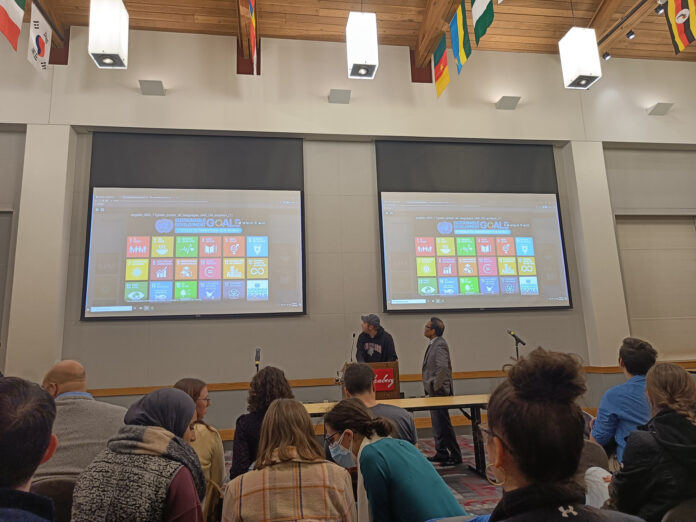On Tuesday, Nov. 29, Ramu Damodaran visited Muhlenberg to give a talk about the future of sustainability in the United Nations. Titled “Hope, Opportunity and Despair: Speculating The Future of United Nations’ Sustainable Development Goals,” the presentation took place in the Great Room at 7 p.m. There was a big turnout, with the crowd ranging from students to professors.
Damodaran began as a journalist in television, radio and print. Before his work at the United Nations, he was the executive assistant to the Prime Minister of India, and was in the Ministries External Affairs, Home Affairs, Defense, Planning and Human Resource Development.
Most recently, Damodaran worked in the United Nations’ department of global communications and oversees the relationships it has with the international community. He is also the chief editor of the United Nations Chronicle and the first chief of the United Nations academic impact. Starting in 2011, Damodaran became the secretary of the United Nations’ General Assembly’s Committee on Information. Damodaran officially retired in May of 2021 but still serves on the leadership council of the sustainable development network and works as Deputy Permanent Observer of the Intergovernmental University for Peace to the United Nations.
The lecture mainly focused on the future of sustainable development goals (SDG) in the United Nations. Damodaran talked about the different factors that destabilized the world and how the United Nations as well as citizens can help change them. Damodaran discussed the seventeen goals of the SDG, including “no poverty, zero hunger, gender equality, and clean water and sanitation.” He went over the step-by-step goals of the United Nations, especially related to its department of global communication. He discussed the many miscommunications with international relationships as it pertains to the United Nations. He also introduced the concept of using Artificial Intelligence in the United Nations, and how we should use every resource available to work towards a more sustainable future. Following the use of AI, he has a specific focus on developing global cybersecurity to protect people and organizations from organized cyber attacks.
William Moody ‘23 commented on the talk, saying, “I really enjoyed being in attendance to hear about the progress that the UN has made on both sustainability and sustainable development after the passing of the Millennium Goals (the goals the UN issued prior to the SDG). It was an amazing experience to hear from someone who has had so much experience in diplomacy in both India’s civil service as well as a representative to the UN. Hearing hands-on accounts from him about how the UN is moving towards completeness in the SDGs and how the SDGs were created was amazing to hear.”
Damodaran went on to discuss topics such as climate change, equal opportunity and education across the world. He spoke about the substantial progress made as an international community over the last century.
Damodaran made strong claims on how public opinion is shaped through media and the consumer. The United Nations’ core mission is to keep countries from fighting each other, and this is extremely important right now, when stakes are high with our current world problems.
Joseph Blumofe ‘26 shared his sentiment, saying, “To be honest, it didn’t really present a plan of action. It more so just demonstrated what their goals were and what they thought those goals were gonna do. He was a great speaker but I feel the talk could have been better.”
Another student, Sophie Tomov ‘26, stated, “I thought it was very humorous and he obviously knew what he was talking about and inserted a lot of jokes to keep the crowd engaged… It’s important for students to know what to do to keep a sustainable world. And I thought it was a very important talk to have and the speaker was amazing.”
Damodaran finished his lecture by discussing the United Nations’ “dare to know” attitude in terms of the unknown future of world peace, technology and health.






















